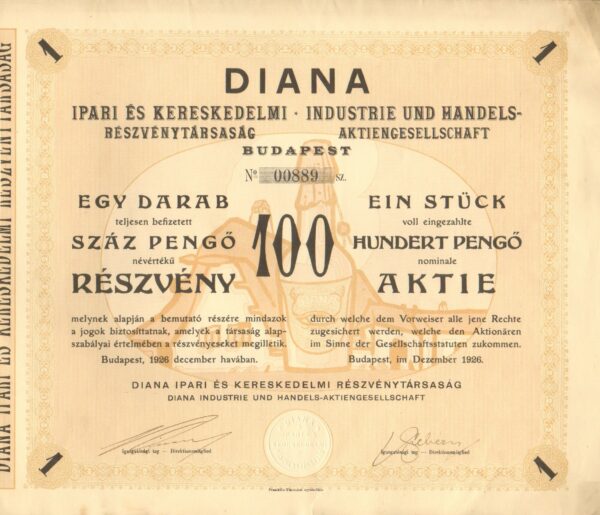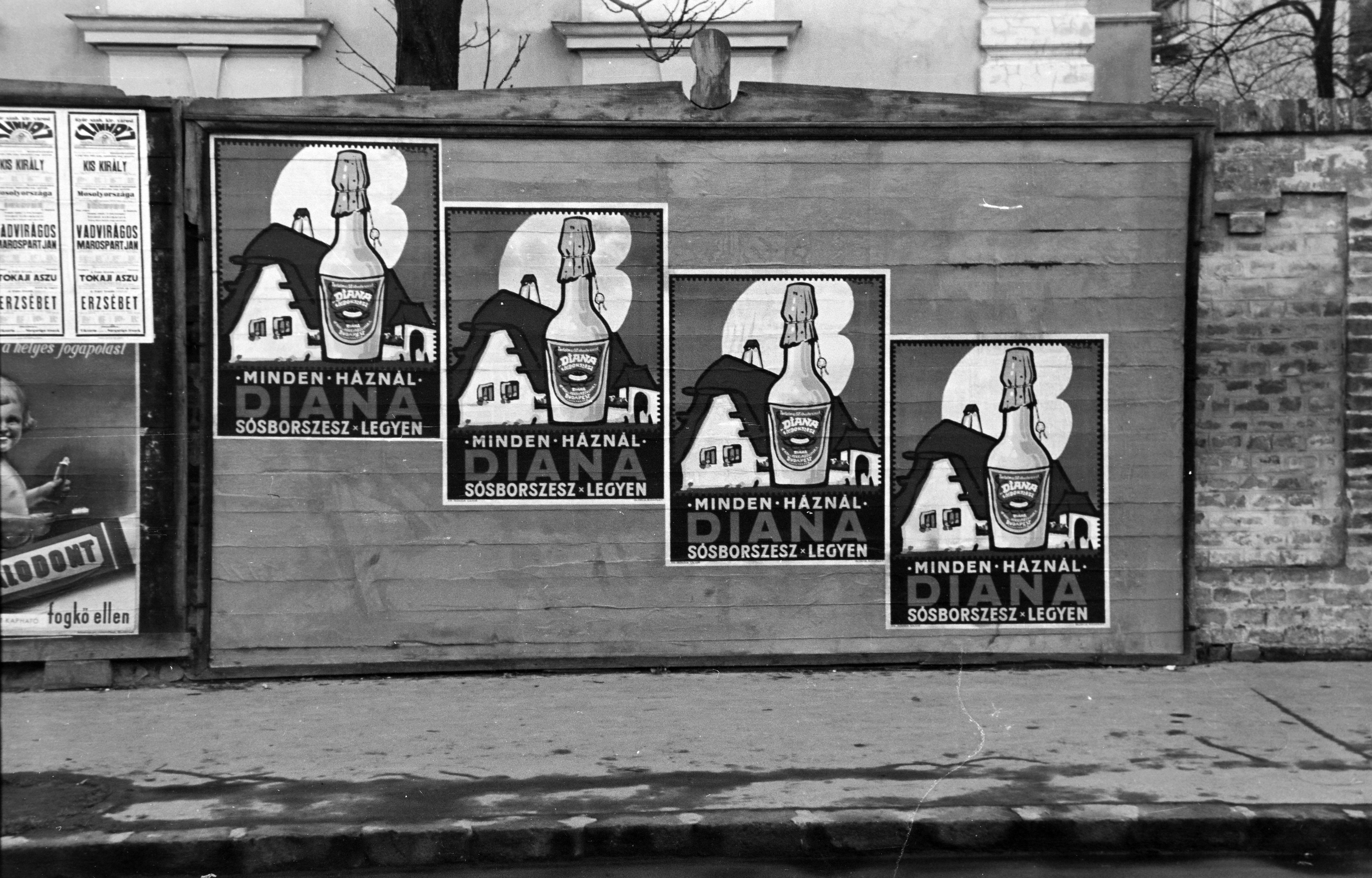Diana industrial and commercial ltd

Salt wine spirits first spread among the peasantry of 18th century France as a panacea. In Hungary, Kálmán Brázay was the first to make a business out of it in 1865, adding various ingredients to the fine spirit and winning Lajos Kossuth, who was living in exile, to the product, which was of great repute at the time. The product was then used externally for pain relief, headaches, disinfection and rheumatism.
At the beginning of the 20th century, in 1905, it was the pharmacist Béla Erényi who, with his menthol variant (Diana wine spirit), quickly ousted Brázay's successor from the market, and in 1910 the rights to Erényi's variant were bought by the Hungarian Value and Industrial Bank Ltd., which founded the Diana department store Rt. This company operated for three years and, in addition to Diana salted wine spirit, also carried on the Yes pouder business among other cosmetics, then in 1914 it continued to operate under the name of Váci Street House Builder Ltd. and the Diana Trading Ltd. was founded on the former profile on 12 November 1914 at 6 Nádor Street, Budapest, with a share capital of K 2 500 000.
In 1915, the company was acquired by the Hungarian Bank and Trading Company, so Diana Rt. also acquired the interests of the Hungarian Lead Factory Rt. and the Borszék Bathing Company Rt. The members of the board of directors at that time were Samu Glückstahl, István Bamberger of Balástya and Aurél Dobay, while Ottó Halász was the CEO. At the beginning of the war they had accumulated considerable losses, so that in 1916 they had a deficit of K 676 279. In 1918 they were in surplus for the first time, then in 1920, during the period of strong inflation of the crown, they had a profit of K 315 308 with a capital stock of K 5 million, and in 1921 K 656 508.

In 1922, the company was taken over by the Anglo-Hungarian Bank Rt., which at the same time became the owner of Panacea Pharmaceutical Rt., Marvell Perfumery Rt., Medicamenta Rt., Diana H. A. G. of Bratislava and Diana S. A. of Bucharest. With the stabilization of the national currency, the share capital was set at 600 000 pence and at the same time, on 30 August 1926, the company changed its name to Diana Commercial and Industrial Ltd. and incorporated Arnea Pharmaceutical Factory Ltd.
The Great Depression had a significant impact on the company's results, closing the year in 1934 with a deficit of P151,877, but afterwards they were able to grow again in the economic cycle. At that time (1920-1940) Gyula Fehér was the CEO of the company. In 1941, Dr. Gyula Gratz took over from him as president of the company. At that time the company was no longer producing only Diana sugar, but also various sweets and chocolates.
With the nationalisation, the company was eventually incorporated under the Hungarian Liquor Industry National Company, which later became the Budapest Distillery Company (Buszesz), which was privatised in 1991 and became the property of the Austrian company Mauthner-Markhof.

Founded on 12 November 1914.
Founders: Hungarian Value and Iparbank Rt.
Securities issued:
| Diana industrial and commercial ltd |
Decisive leaders:
1914-1920 | Ottó Halász CEO |
1920-1941 | Gyula Fehér CEO |
1941- | Dr. Gusztáv Gratz President |
Main activity: production and sale of wine spirits and cosmetic products
Seats:
1914 | Bp. Nádor utca 6. |
Author: by Dr. Márton Pelles
Founded on 12 November 1914.
Founders: Hungarian Value and Iparbank Rt.
Decisive leaders:
1914-1920 | Ottó Halász CEO |
1920-1941 | Gyula Fehér CEO |
1941- | Dr. Gusztáv Gratz President |
Main activity: production and sale of wine spirits and cosmetic products
Main products are not set
Seats:
1914 | Bp. Nádor utca 6. |
Locations are not set
Main milestones are not set
Author: by Dr. Márton Pelles
Diana industrial and commercial ltd

Salt wine spirits first spread among the peasantry of 18th century France as a panacea. In Hungary, Kálmán Brázay was the first to make a business out of it in 1865, adding various ingredients to the fine spirit and winning Lajos Kossuth, who was living in exile, to the product, which was of great repute at the time. The product was then used externally for pain relief, headaches, disinfection and rheumatism.
At the beginning of the 20th century, in 1905, it was the pharmacist Béla Erényi who, with his menthol variant (Diana wine spirit), quickly ousted Brázay's successor from the market, and in 1910 the rights to Erényi's variant were bought by the Hungarian Value and Industrial Bank Ltd., which founded the Diana department store Rt. This company operated for three years and, in addition to Diana salted wine spirit, also carried on the Yes pouder business among other cosmetics, then in 1914 it continued to operate under the name of Váci Street House Builder Ltd. and the Diana Trading Ltd. was founded on the former profile on 12 November 1914 at 6 Nádor Street, Budapest, with a share capital of K 2 500 000.
In 1915, the company was acquired by the Hungarian Bank and Trading Company, so Diana Rt. also acquired the interests of the Hungarian Lead Factory Rt. and the Borszék Bathing Company Rt. The members of the board of directors at that time were Samu Glückstahl, István Bamberger of Balástya and Aurél Dobay, while Ottó Halász was the CEO. At the beginning of the war they had accumulated considerable losses, so that in 1916 they had a deficit of K 676 279. In 1918 they were in surplus for the first time, then in 1920, during the period of strong inflation of the crown, they had a profit of K 315 308 with a capital stock of K 5 million, and in 1921 K 656 508.

In 1922, the company was taken over by the Anglo-Hungarian Bank Rt., which at the same time became the owner of Panacea Pharmaceutical Rt., Marvell Perfumery Rt., Medicamenta Rt., Diana H. A. G. of Bratislava and Diana S. A. of Bucharest. With the stabilization of the national currency, the share capital was set at 600 000 pence and at the same time, on 30 August 1926, the company changed its name to Diana Commercial and Industrial Ltd. and incorporated Arnea Pharmaceutical Factory Ltd.
The Great Depression had a significant impact on the company's results, closing the year in 1934 with a deficit of P151,877, but afterwards they were able to grow again in the economic cycle. At that time (1920-1940) Gyula Fehér was the CEO of the company. In 1941, Dr. Gyula Gratz took over from him as president of the company. At that time the company was no longer producing only Diana sugar, but also various sweets and chocolates.
With the nationalisation, the company was eventually incorporated under the Hungarian Liquor Industry National Company, which later became the Budapest Distillery Company (Buszesz), which was privatised in 1991 and became the property of the Austrian company Mauthner-Markhof.
